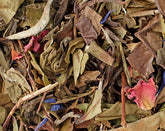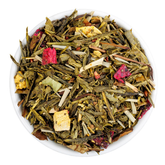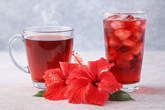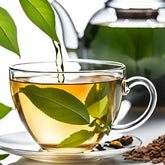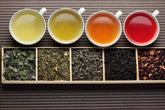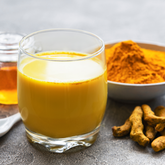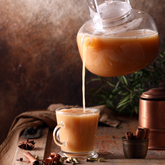If you’re a tea drinker, you’re probably familiar with the soothing feeling that accompanies a good cup of tea - and now this calming, stress-reducing effect is backed by science! Research shows that tea made from the camellia sinensis plant contains l-theanine, a beneficial compound that helps to reduce anxiety and promote relaxation and wellbeing.
L-theanine is found primarily in tea, as well as in some types of mushrooms. While l-theanine is also available in supplement form, you can reap just as many benefits with an ordinary cup of tea!
What is l-theanine?
Studies show that l-theanine can help to reduce feelings of stress and anxiety. L-theanine works by blocking excitatory neurotransmitters like glutamate, resulting in feelings of calm and relaxation. L-theanine also stimulates a related neurotransmitter called GABA, which produces its own calming, anxiety-reducing effects. Unlike compounds with similar properties, l-theanine doesn’t contribute to drowsiness or a lack of alertness. Instead, the l-theanine present in tea provides a soothing, calming effect without making you feel sleepy!
L-theanine in tea
Aside from its potent stress-reducing effects, l-theanine is also responsible for the umami taste in tea. This savory-sweet characteristic gives tea a rich depth of flavor in addition to its unique health benefits. While l-theanine is present in all loose leaf tea made from the camellia sinensis plant, certain teas like matcha, shade-grown green teas, and first flush teas contain particularly high levels of l-theanine. Factors that can influence the l-theanine content in tea include:
- Growing practices - Shade-grown Japanese teas tend to be especially high in l-theanine. This includes shaded full leaf teas like Gyokuro and Kabusecha as well as Matcha, which is a form of powdered shade-grown green tea. The shading process induces a stress response in the tea plant, resulting in elevated levels of l-theanine, caffeine, and other beneficial properties.
- Processing methods - L-theanine may be better-preserved in teas that undergo minimal processing. This includes minimally processed green teas and white teas.
- Harvest time - Teas that are harvested early in the spring, including first flush teas and silver needle teas, tend to be higher in l-theanine.
Without access to precise scientific tools, it can be difficult to accurately measure the l-theanine content in a particular tea. One hint that a tea may be high in l-theanine is if it has a distinct umami-like flavor. While studies indicate that some types of tea contain slightly more l-theanine, all types of tea made from the camellia sinensis plant contain some l-theanine, making whatever cup of tea you fancy a healthful choice, including black, white, oolong, and purple tea. Herbal teas won’t contain any l-theanine, since they’re not made from the camellia sinensis tea plant.
Tea and mindfulness
While scientific research has only recently caught up, tea has been used to reduce stress, promote wellbeing, and enhance cognitive function for hundreds of years. Tea is an important component of ceremonies, rituals, and religious practices all over the world, from the matcha-based Japanese tea ceremony to the Gongfu tea ceremony in China and everywhere in between. These unique traditions are often hundreds of years old, and have been perfected over the course of centuries. Tea ceremonies force participants to slow down and engage with the world in a mindful, meditative manner.
Tea preparation and consumption are also especially associated with meditation and mindfulness. Tea was first incorporated into religious rituals during the Tang dynasty, and became closely associated with temples and monasteries. The l-theanine and caffeine present in tea are thought to aid in mindfulness and meditation by helping to induce a calm, alert state that combines stimulation and relaxation.
Other benefits of l-theanine
In addition to its use as an aid for stress-relief and relaxation, l-theanine has been shown to have a variety of related benefits. While l-theanine doesn’t contribute to drowsiness or lack of focus, it can be used as an effective sleep aid to help promote deep, high quality sleep. L-theanine also has other beneficial effects, including boosting the immune system, reducing blood pressure, and even warding off certain types of cancer. When combined with caffeine in a cup of tea, l-theanine has been shown to promote focus and clarity, making it a great study aid. The combination of caffeine and l-theanine helps to promote cognitive function and increase alertness and attention.
No matter what kind of tea you enjoy, drinking tea can be especially beneficial for stress relief, and can be a welcome moment of calm in an otherwise hectic day. Both scientific research and personal experience suggest that a cup of tea can be a great way to unwind, relax, and destress. Next time you’re feeling overwhelmed by life, take a moment to brew up a cup, and enjoy!
One Tea that is high in l-theanine is Matcha
In addition to loose leaf tea, high amount of l-theanine is also found in matcha, a powdered green tea from Japan. Since matcha is made from the whole leaves of tea plants ground into a fine, bright green powder, it contains more concentrated levels of everything that makes tea so healthful, including l-theanine.
FAQs about l-theanine and tea
Does green tea have l-theanine?
Yes, green tea contains l-theanine. Shade-grown green teas, like Gykuro, Kabusecha, and matcha are especially high in l-theanine.
What is the green tea with the most l-theanine?
Matcha, which is made from green tea leaves stone-ground into a fine powder, is especially high in l-theanine. This is because when you drink matcha, you're consuming the whole tea leaf, and so ingesting a concentrated amount of the many beneficial properties present in green tea.
How much l-theanine is in black tea?
Like other types of tea, black tea does contain l-theanine. However, because it is processed in a different way, black teas are often lower in l-theanine than green teas. Some exceptions are first flush black teas, like first flush darjeeling. These teas are composed of the first buds and tips of the tea plant, which tend to be higher in l-theanine.
What does l-theanine feel like?
L-theanine is known for its calming, relaxing effect. When combined with the caffeine present in tea, l-theanine is said to contribute to a state of calm, meditative focus.
What are other natural sources of l-theanine?
Tea made from the camellia sinensis tea plant is the major natural source of l-theanine. However, this beneficial compound is also found in a few species of mushrooms.
Does matcha have l-theanine?
Yes, matcha is high in l-theanine. If you're looking for a way to incorporate more l-theanine into your daily routine, then enjoying a matcha latte or a bowl of ceremonial grade matcha is a great choice!
Does l-theanine make you sleepy?
L-theanine is known for its calming and anti-anxiety effects. On its own, l-theanine can make you feel more relaxed. But since l-theanine is often combined with caffeine when present in tea, it can also contribute to feelings of focus and mental clarity.

